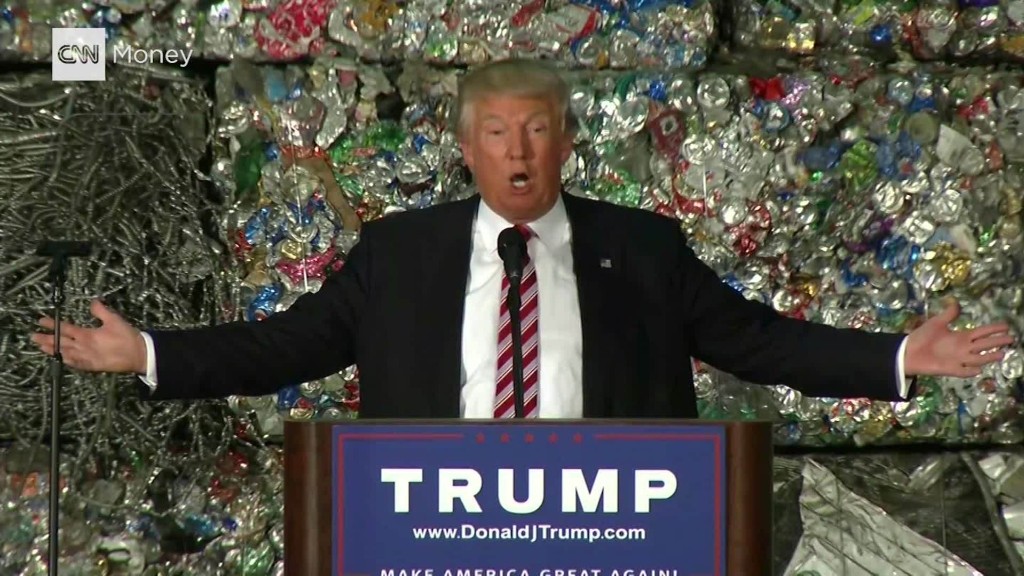
Donald Trump calls the Chinese "cheaters" and "manipulators."
He's made it clear that if he becomes president, the U.S. will no longer lose big to China. To fight back, he talks often of slapping a 45% tax -- or a tariff -- on Chinese goods coming into the U.S.
As Trump frequently points out, there's a huge imbalance in U.S.-China trade. Last year, the U.S. bought almost $500 billion worth of goods from China. In contrast, the U.S. sold only $165 billion worth of stuff and services to the Chinese.
Many experts say Trump is right that China isn't playing fair on trade. But they warn his massive tariff would be a mistake. It would start a trade war and wouldn't solve the critical issue.
There's a lengthy list of ways China plays by its own rules, but the No. 1 problem is the theft of U.S. business secrets and technology by Chinese companies. China doesn't want to be the manufacturer of cheap shoes and shirts forever. It wants to go head-to-head with the U.S. in the high tech economy. China is doing everything it can to catch up.
"China is trying by any way possible to take advanced technology," says Derek Scissors, a scholar at the American Enterprise Institute. "They will buy it if they can. They will coerce [U.S. companies]...then there is the outright theft."
Related: China is crushing the U.S. in 'economic warfare'
How to bring jobs back from China
Chinese companies illegally steal over $200 billion worth of American business secrets -- known as intellectual property -- each year, according to a bipartisan commission report from 2013. The Chinese try to copy movies, electronics and software and churn them out at a cheaper rate.
Over 2 million jobs would return to America if China had laws to protect business secrets like the U.S. does, the report from the Commission on the Theft of American Intellectual Property concluded.
It's become a key campaign issue. Both Trump and Hillary Clinton talk tough on China.
"If China does not stop its illegal activities, including its theft of American trade secrets, I will use every lawful presidential power to remedy trade disputes, including the application of tariffs," he said in a speech outlining his trade policy in late June.
Clinton vows she'll "throw the book at China for their illegal actions."
Related: Yes, China has won big from U.S. trade
More ways China doesn't play fair
Theft is just one headache. The Chinese government has developed a reputation for changing rules on a whim and heavily favoring domestic companies.
China has made no secret of its intentions to dominate certain industries. For example, it has regularly been accused of "dumping" really cheap steel on world markets. China denies those claims, but U.S. and European steel makers say the intent is to drive them out of business.
The Chinese government has also heavily subsidized certain industries, something that is against the rules of the World Trade Organization, which China joined in 2001. A scathing report from the Information Technology and Innovation Foundation, a U.S. think tank, details how China's government plans to pump $100 billion into the Chinese semiconductor industry and restrict U.S. imports. Foreign companies that play by the rules can't compete with that kind of government intervention.
And that's to say nothing of the heavy censorship of foreign businesses like Google (GOOG) and Apple (AAPL) trying to operate in China. This spring, China shut down Apple iBooks and iTunes Movies with little explanation.
China's cheap currency
Then there are the frustrations over China's currency. Many countries believe China purposefully kept its currency, the yuan, at a very cheap level. That makes Chinese goods inexpensive for customers in the U.S., Europe, Japan and elsewhere. Trump and Clinton both want to formally label China a "currency manipulator."
This is one area where China has been showing some signs of shaping up. It has actually lifted the value of its currency in the past two years. The International Monetary Fund even says the yuan is "no longer undervalued." Still, the issue could easily come back. China just devalued its currency after Brexit.
Related: Give me safety: U.S. bond yield hits record low
What the U.S. can do to push back
So what should the U.S. do? Numerous experts told CNNMoney that Trump's tariff solution is too extreme. It's akin to hammering a nail with a 18-wheeler truck.
"An across the board tariff doesn't make sense. It punishes Chinese firms that don't cheat," says Scissors, who worked for many years as a consultant to U.S. companies trying to enter the Chinese market.
A sweeping tariff would also make a lot of stuff more expensive for poor and middle class Americans when they shop. A typical American family would pay between $800 to $2,200 more a year if Trump's policies went into place, according to economists.
Instead of a big tariff, Robert Atkinson, president of the Information Technology and Innovation Foundation, says the next president should start with some level-playing tactics:
- Stop letting China invest in the U.S. unless it makes it easier for U.S. companies to set up in China
- Deny China access to the U.S. banking system and/or U.S. stock market
- Put sanctions on companies that have stolen U.S. technology
- Refuse to give Chinese patents protection in the U.S. until China honors American patents there
- Cut off scientific and other cooperation with China
- Bring more World Trade Organization cases against China
- Form a coalition with Europe and Japan to push back
"Imagine if the Chinese were shooting down our airplanes in their airspace. Would we just sit there and go, 'meh?'" asks Atkinson. He's one, of many, hoping the next president will get a lot tougher.


